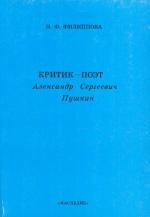|
This section contains 4,983 words (approx. 17 pages at 300 words per page) |

|
SOURCE: "Pushkin's Little Tragedies: The Controversies in Criticism," in Canadian Slavonic Papers, Vol. XXII, No. 1, March, 1980, pp. 80-91.
In the following essay, Karpiak surveys twentieth-century thematic criticism of Pushkin's dramas The Covetous Knight, Mozart and Salieri, and The Stone Guest.
"There is nothing more difficult," wrote Vissarion Belinskii, "than to speak about a work of literature which is great in its totality and in its parts." "To such works," he continues, "belong Skupoi rytsar', Motsart i Sal'eri, and Kamennyi gost'."1 The veracity of Belinskii's assessment of Alexander Pushkin's Little Tragedies (Malen'kie tragedii) as creations of high artistic merit and, at the same time, of high problematic complexity is well-substantiated. Important not only as masterpieces of Pushkin's oeuvre, but also as innovative developments in the evolution of Russian dramatic literature, this cycle of brief plays has long attracted the attention of scholars and has given rise to a voluminous...
|
This section contains 4,983 words (approx. 17 pages at 300 words per page) |

|


